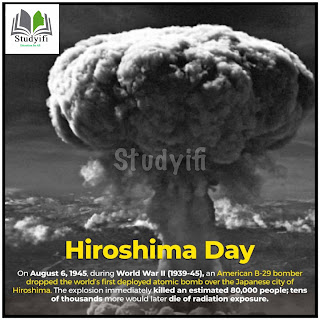"Hiroshima Day is observed on August 6 every year to raise awareness of the disastrous effects of the atom bomb and the need to promote "peace politics" among nations.
Significance:
• On August 6, 1945, during World War II (1939-45), an American B-29 bomber dropped the world’s first deployed atomic bomb over the Japanese city of Hiroshima.
• The explosion immediately killed an estimated 80,000 people; tens of thousands more would later die of radiation exposure.
• Three days later, a second B-29 dropped another A-bomb on Nagasaki, killing an estimated 40,000 people.
• Japan’s Emperor Hirohito announced his country’s unconditional surrender in World War II in a radio address on August 15, citing the devastating power of “a new and most cruel bomb.”
• Hiroshima Day 2021 marks the 76th anniversary of the killings. According to a Reuters report, the IOC will honour the anniversary during the Tokyo 2020 closing ceremony, which is scheduled for August 8.
History • After Germany's surrender to the Allied forces in May 1945, the Second World War continued in Asia as the Allies fought imperial Japan. The United States believed that the use of a nuclear bomb would force Japan to yield and save millions of US casualties.
• The US created two atom bombs through the Manhattan Project, a program for developing nuclear weapons. The first bomb called 'Little Boy', was to be dropped on Hiroshima, and the second one, called 'Fat Man', was to be dropped on Nagasaki.
• On the morning of August 6, 1945, an American B-29 bomber dropped 'Little Boy,' on Hiroshima city killing almost 80,000 people instantly. A thousand others died belatedly due to radiation exposure.
• After three days, on August 9, another B-29 dropped 'Fat Man' on Nagasaki killing another 40,000 people.
• The bombings marked the end of World War II as six days after the explosion over Nagasaki, on August 15 Japan was forced to yield to the Allied Powers.
• According to officials, the decision to use nuclear weapons against Japan was made after an analysis revealed that a far greater number of people would have died if Japan was invaded by Allied forces.
Why was Hiroshima targeted?
• The city was targeted because it held strategic personnel and installations. Hiroshima was the headquarters of the 2nd General Army and 5th Division with 40,000 Japanese combatants posted within the city's limit. Many other cities were chosen for similar reasons, however, some were rejected due to bad weather.
• According to sources, around 54% of the deaths in Hiroshima were combatants and slave labourers while 72% of the deaths in Nagasaki were war industry employees and slave labourers.
• Japan's harrowing experience during the Second World War led to the adoption of the three Non-Nuclear Principles which stated that the country would not create or try to arrange nuclear weapons in the future.
• During the annual Hiroshima anniversary, the government reconfirms its commitment to a nuclear-free world.


Comments
Post a Comment